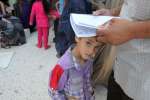- Text size
 |
|  |
|  |
| 
- Français
UNHCR chief addresses UN Security Council on deepening crisis in Syria
News Stories, 30 August 2012
NEW YORK, United States, August 30 (UNHCR) – UN High Commissioner for Refugee António Guterres on Thursday addressed the UN Security Council on the "dramatic and deepening humanitarian crisis" in Syria, while calling for increased international support for relief efforts.
Noting Syria's long and generous history of providing refuge to people in need of sanctuary, including Palestinian and Iraqi refugees, he said it was "now particularly heartbreaking to see so many Syrian citizens losing their lives, uprooted from their homes, and trapped in war zones."
The High Commissioner, noting that the ability of "the international system" to respond to the escalating violence in Syria was being tested in many ways, called on all parties to the conflict "to grant unrestricted humanitarian access inside Syria in order to enable humanitarian actors to deliver protection and assistance."
He also urged all parties to continue to respect and provide protection to the tens of thousands of Iraqi, Palestinian and other refugees inside Syria. "We are all aware of the complexity of the Palestinian refugee issue, and its impact on countries in the region. A situation in which large numbers of Palestinians are forced to flee must be avoided at all cost," he stressed.
Guterres also called for "enhanced international support to all victims of the conflict. I urge all states to respond positively to the two appeals that will shortly be made by the humanitarian community for additional funding in countries of asylum and inside Syria." But he added that international support must also "translate into effective burden-sharing and meaningful support to governments and communities in refugee-hosting countries."
The High Commissioner also asked all states in the region and beyond to "continue to extend protection to the Syrians fleeing their country, and to ensure that the civilian and humanitarian character of asylum is maintained, in accordance with international law."
He said the commitment of neighbouring countries to refugee protection has "upheld the internationally recognized principle whereby all human beings have the right to seek and enjoy asylum in another state."
"This is a right," he stressed, "that must not be jeopardized, for instance through the establishment of so-called 'safe havens' or other similar arrangements. Bitter experience has shown that it is rarely possible to provide effective protection and security in such areas."
In conclusion, Guterres said there could be no humanitarian solution to the Syrian crisis. "Only through a political solution leading to peace can the humanitarian emergency be brought to a conclusion," he stressed, adding: "As history has so clearly demonstrated in the Middle East and elsewhere, it is in nobody's interest for a political conflict and the plight of its resultant refugee population to be left unresolved."









































